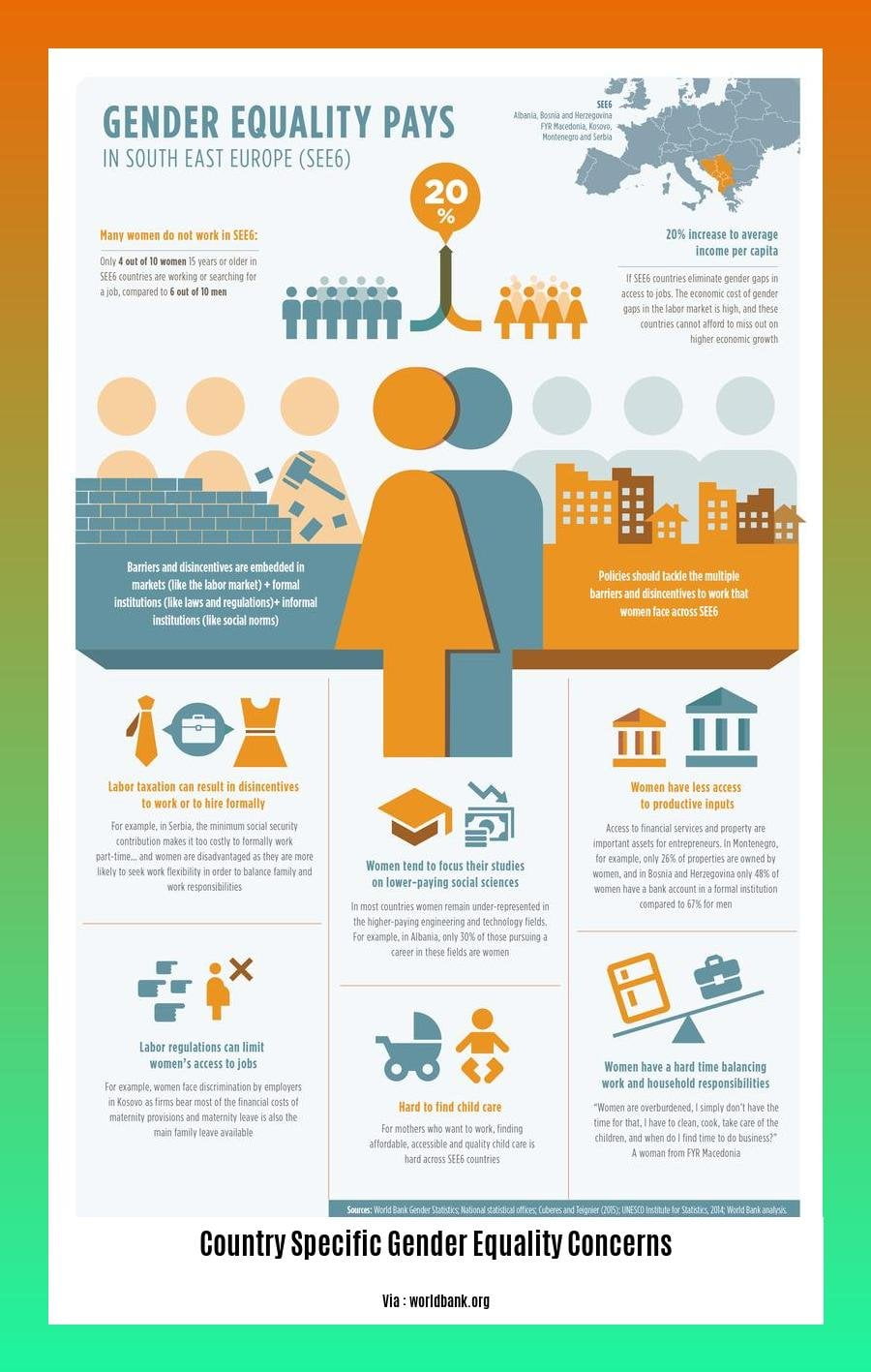**Country-Specific Gender Equality Concerns: Addressing Challenges and Empowering Marginalized Genders**

Key Takeaways:
- Women remain underrepresented in leadership roles, with only 27% in parliamentary seats and 36% in management.
- Poverty and economic disadvantages disproportionately affect women, with over 340 million living in poverty.
- Workplace discrimination persists, with women earning less and underrepresented in the workforce.
- Unpaid care work falls primarily on women, hindering their economic advancement.
- Harmful social norms and practices, such as child marriage and gender-based violence, continue to hinder women’s empowerment.
- The gender pay gap perpetuates economic inequality.
- Education and healthcare access are critical for women’s empowerment.
- Women’s political representation and decision-making roles are essential.
- Gender inequality has severe consequences for economic growth, poverty, and violence against women.
Country-Specific Gender Equality Concerns
Let’s talk about gender equality concerns that are unique to different countries. These issues can be complex and vary significantly depending on the historical, cultural, and socio-economic factors at play. Understanding these country-specific gender equality concerns is crucial for developing effective policies and interventions that promote gender equality and empower marginalized genders.
Addressing Challenges
Addressing country-specific gender equality concerns requires a tailored approach that considers the specific challenges and obstacles faced by women and marginalized genders in that particular context. This may involve:
- Analyzing and addressing discriminatory laws and policies that perpetuate gender inequality.
- Challenging harmful social norms and practices that limit women’s opportunities and freedoms.
- Investing in education and skills training for women and girls to enhance their economic empowerment.
- Promoting women’s participation in decision-making processes at all levels.
- Providing access to essential services such as healthcare, childcare, and legal aid for women and marginalized genders.
Empowering Marginalized Genders
Empowering marginalized genders is essential for achieving gender equality. This can be done by:
- Creating safe and inclusive spaces for women and marginalized genders to share their experiences and advocate for their rights.
- Supporting organizations and initiatives that work to promote gender equality and empower marginalized genders.
- Challenging stereotypes and prejudices that perpetuate discrimination against women and marginalized genders.
- Holding governments and institutions accountable for upholding gender equality commitments and protecting the rights of women and marginalized genders.
Moving Forward
Addressing country-specific gender equality concerns and empowering marginalized genders is a complex but essential task. By understanding the unique challenges and barriers faced by women and marginalized genders in different countries, we can develop targeted strategies and interventions that promote gender equality and create a more just and equitable society for all.
For an informative report on the various challenges faced by women globally, explore our in-depth analysis of women’s rights issues by country. To gain insights into the specific obstacles encountered by women in different nations, delve into our dedicated section on national women’s rights challenges. Furthermore, to understand the disparities in women’s status across different geographical regions, refer to our comprehensive study on women’s status differences across nations.
Analysis of gender equality policies and laws
Exploring the frameworks that shape gender equality is paramount to understanding the nuances of this multifaceted issue. Analysis of gender equality policies and laws provides a thorough review of the legal and policy landscape, highlighting both the progress made and the challenges that persist.
By delving into country-specific contexts, we can identify the unique obstacles and opportunities that exist. This granular approach allows for tailored strategies that address the specific needs of each society.
Key Takeaways:
- Gender equality is essential for sustainable development and the well-being of all individuals.
- Discriminatory laws and policies perpetuate gender inequality, limiting access to education, employment, and resources.
- Stronger laws, policies and institutions are imperative for achieving gender equality.
- Tailored approaches are necessary to address country-specific gender concerns effectively.
- Empowering marginalized genders is crucial for building a more just and equitable society.
Citation:
* UNICEF. (2021). Gender Policy 2021-2030.
Social norms and practices perpetuating gender discrimination
Societal norms and practices play a significant role in perpetuating gender discrimination. These deeply ingrained beliefs and behaviors create barriers that limit opportunities and rights for marginalized genders.
Gender discrimination manifests through various social norms, including:
- Limited access to education and employment for women
- Gender-based violence and harassment
- Unequal distribution of household responsibilities
- Stereotypes and biases that reinforce gender roles
Changing these harmful norms is crucial for achieving gender equality. It requires challenging social expectations, addressing biases, and promoting inclusive behaviors. Education, awareness campaigns, and legal reforms can contribute to creating a more equitable society.
Key Takeaways:
- Social norms and practices can perpetuate gender discrimination, limiting opportunities for marginalized genders.
- Harmful social norms include restricted access to education, gender-based violence, and unequal household responsibilities.
- Challenging societal norms, promoting inclusive behaviors, and implementing legal reforms are essential for gender equality.
Citation:
OECD. (2023). Social Institutions and Gender Index (SIGI) 2023.
Challenges and obstacles faced by marginalized genders
Country-specific gender equality concerns require focused approaches that recognize and address the unique challenges and obstacles faced by marginalized genders. These include:
- Limited opportunities: Women and marginalized genders face systemic barriers to education, employment, and economic empowerment.
- Violence and discrimination: Marginalized genders are disproportionately vulnerable to violence, discrimination, and harassment.
- Lack of representation: Women and marginalized genders are often underrepresented in leadership and decision-making positions.
- Harmful social norms: Stereotypes and biased societal norms perpetuate gender inequality and limit opportunities for marginalized genders.
- Political and legal barriers: Discriminatory laws and policies can hinder progress towards gender equality.
Key Takeaways:
- Gender equality is a global issue that affects all countries.
- Women and marginalized genders face a range of challenges and obstacles that limit their opportunities.
- Addressing these challenges requires a tailored and multifaceted approach that involves legal reforms, social change, and economic empowerment.
Citation:
UN Women: 11 Biggest Hurdles for Women’s Equality by 2030











